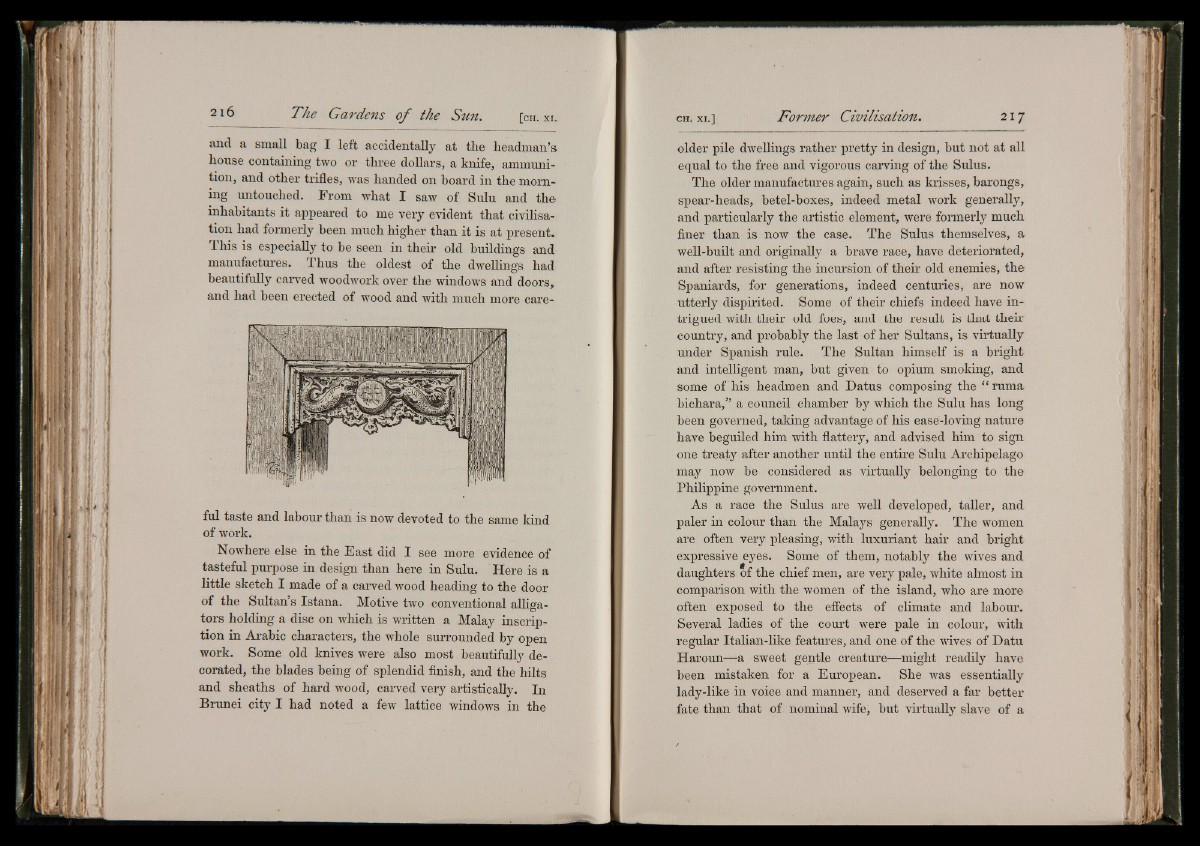
and a small bag I left accidentally at the headman’s
house containing two or three dollars, a knife, ammunition,
and other trifles, was handed on board in the morning
untouched. From what I saw of Sulu and the
inhabitants it appeared to me very evident that civilisation
had formerly been much higher than it is at present.
This is especially to be seen in their old buildings and
manufactures. Thus the oldest of the dwellings* had
beautifully carved woodwork over the windows and doors,
and had been erected of wood and with much more careful
taste and labour than is now devoted to the same kind
of work.
Nowhere else in the East did I see more evidence of
tasteful purpose in design than here in Sulu. Here is a
little sketch I made of a carved wood heading to the door
of the Sultan’s Istana. Motive two conventional alligators
holding a disc on which is written a Malay inscription
in Arabic characters, the whole surrounded by open
work. Some old knives were also most beautifully decorated,
the blades being of splendid finish, and the hilts
and sheaths of hard wood, carved very artistically. In
Brunei city I had noted a few lattice windows in the
older pile dwellings rather pretty in design, but not at all
equal to the free and vigorous carving of the Sulus.
The older manufactures again, such as krisses, barongs,
spear-heads, betel-boxes, indeed metal work generally,
and particularly the artistic element, were formerly much
finer than is now the case. The Sulus themselves, a
well-built and originally a brave race, have deteriorated,
and after resisting the incursion of their old enemies, the
Spaniards, for generations, indeed centuries, are now
utterly dispirited. Some of their chiefs indeed have intrigued
with their old foes, and the result is that their
country, and probably the last of her Sultans, is virtually
under Spanish rule. The Sultan himself is a bright
and intelligent man, but given to opium smoldng, and
some of his headmen and Datus composing the “ ruma
bichara,” a council chamber by which the Sulu has long
been governed, taking advantage of his ease-loving nature
have beguiled him with flattery, and advised him to sign
one treaty after another until the entire Sulu Archipelago
may now be considered as virtually belonging to the
Philippine government.
As a race the Sulus are well developed, taller, and
paler in colour than the Malays generally. The women
are often very pleasing, with luxuriant hair and bright
expressive eyes. Some of them, notably the wives and
daughters of the chief men, are very pale, white almost in
comparison with the women of the island, who are more
often exposed to the effects of climate and labour.
Several ladies of the court were pale in colour, with
regular Italian-like features, and one of the wives of Datu
Haroun—a sweet gentle creature—might readily have
been mistaken for a European. She was essentially
lady-like in voice and manner, and deserved a far better
fate than that of nominal wife, but virtually slave of a